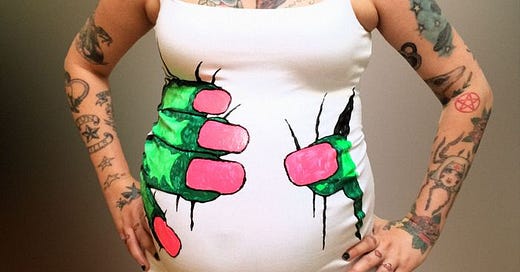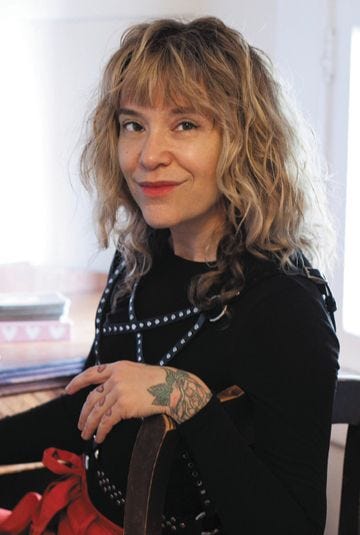Adventurous, delicious, invasive, destabilising, wondrous. . .
This is how essayist Michelle Tea described queer motherhood to us
This week, we are very excited to share our interview with Michelle Tea. Michelle is an American author, poet, and literary artist. She’s a PEN/America Award winner, 2021 Guggenheim fellow, and modern tarot icon (check out her book about ‘Connecting with your Higher Self through the Wisdom of Cards’). Her autobiographical works explore feminism, queerness, race, class and sex work. Out next month in the UK is, Knocking Myself Up, about her journey to queer motherhood. Michelle recently wrote an amazing piece for New York Magazine’s The Cut called My Queer Family Vs The Supreme Court. Because her (now ex) partner donated the eggs she carried she feels she must adopt the child she gave birth to in order to secure her parentage, given the homophobic legislation in some US states. She talks to us about her fertility journey, experience of pregnancy and life now as a queer Mum.
Could you start with the when, where and how of your pregnancy story?
When: Started in 2011; had my baby in 2014
Where: San Francisco, California, USA
How: Began with at-home inseminations with my drag Queen sperm donor collecting his materials in my kitchen, handing it off to my friend who them brought it to me on my bedroom, where she helped me get it into my body with the help of a Children’s medicine syringe. Eventually I met my ex-spouse and it became a joint project; they put me on their insurance, and I wound up going to a fertility clinic and learning my eggs are busted. We decided I would carry my then-partner’s egg and we would continue to use my friend’s sperm. We did three IUI processes - one didn’t take, one was a miscarriage, and in the final two zygotes were transferred and one came out!
What was the lowest moment ?
So many different types of lows, hard to decide! Guzzling a jar of pickle juice? Projectile vomiting in a movie theater bathroom? Lashing out at a bookstore worker who trolled me online after I canceled an event due to IVF-related emotional instability? Miscarrying the night before my wedding? Bursting into tears in a yoga class after realizing how much my body had been through?
Funniest moment?
Discovering a message board full of pregnant people who can’t stop guzzling jars of pickle juice?
What was your approach to the two week wait?
Obsessively monitoring my body and gossiping about it with my sister. Savoring the brand new experience of maybe being pregnant!
Message boards and online forums - discuss!
Most of the ones I encountered were very Christian, very straight, and were permeated by a sentimentality towards babies and children and motherhood that I absolutely did not relate to. And lots of emojis and acronyms! It was briefly entertaining, but not very helpful. The Berkeley Parents Network, which is very queer, was far more helpful, and all of it inspired me to create the real life parenting online Zine, Mutha.
Did your queer identity evolve in any way during your fertility journey?
I started this process later in life - age 40 - and had had many previous experiences that helped evolve my queer identity, such as a partner transitioning to male, or getting sober. I feel like, by the time I started aiming for pregnancy I had a very strong queer identity that I nonetheless hold lightly, knowing how the particularities might shift. Having lived in a queer bubble for decades, though, suddenly being in a system that didn’t see me and my queer relationship was really infuriating!
“I equate queerness with big, life-defining passions, and a willingness to let desire transform you and take you beyond the bounds of what mainstream culture finds appropriate.”
Do you feel there is something inherently queer about the experience of being pregnant?
That’s a great question. Kind of! The way my body morphed, the way my desire for food and sex/orgasms became so huge. I equate queerness with big, life-defining passions, and a willingness to let desire transform you and take you beyond the bounds of what mainstream culture finds appropriate. I felt very I appropriate while pregnant, while also getting a lot of privilege as a white woman fulfilling this classic patriarchal duty. And even that duality felt sort of queer, like I was passing as something I really wasn’t, the way queers have historically moved through the world with our own delicious secrets.
/// PLEASE DO CONSIDER PAYING JUST OVER £4 PER MONTH TO READ THE REST OF THIS BRILLIANT INTERVIEW WHICH INCLUDES MICHELLE’S QUEER PARENTING BOOK RECOMMENDATIONS. YOUR SUBSCRIPTION HELPS US TO KEEP PRODUCING THIS WEEKLY NEWSLETTER AND WE ARE SO GRATEFUL FOR YOUR SUPPORT :-) ///




